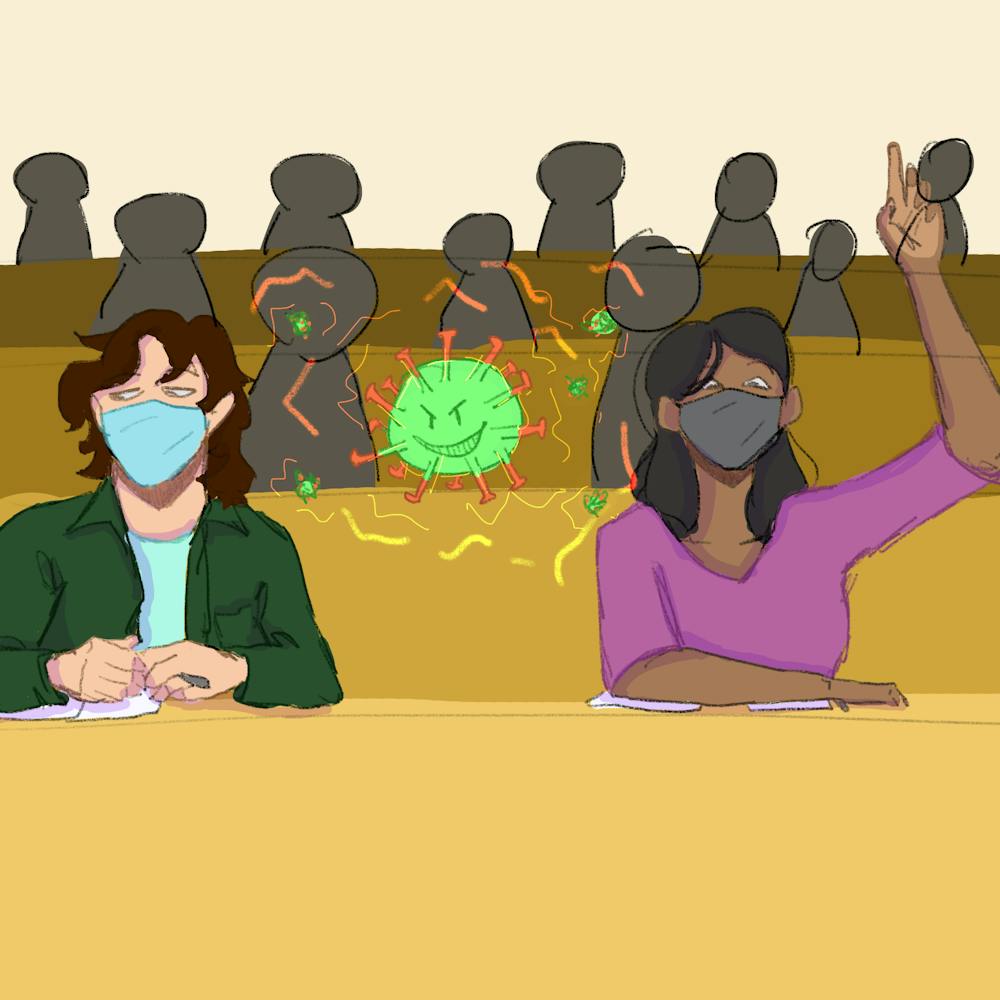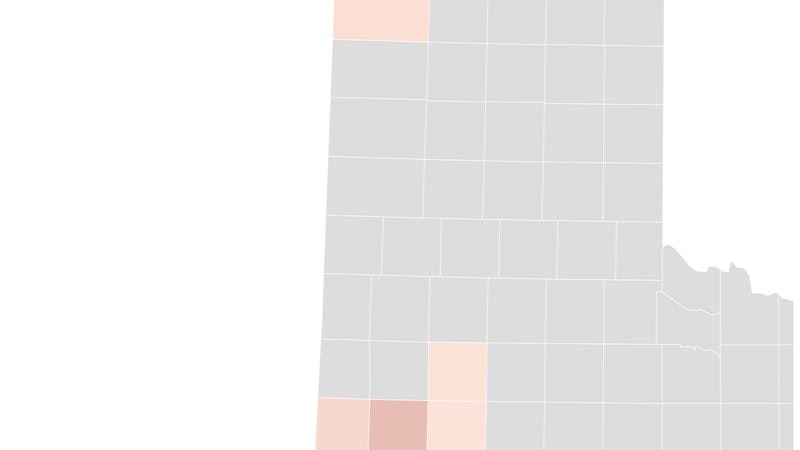Rice community discusses classroom mask policy continuation

Rice reports that the classroom mask mandate will most likely continue for the semester despite there being no evidence of transmission in the classroom, according to Kevin Kirby, the Crisis Management Advisory Committee chair. Some professors have said they prefer for the mask mandate to remain in place, due to the state of COVID in Houston.
Kirby said that, verified through Rice’s robust contact tracing efforts, Rice has documented zero cases of the virus to be transmitted within a classroom setting over the last eighteen months.
“[From] what we have learned over the last 18 months of how the SARS-CoV-2 virus is transmitted, it is [particularly] transmitted through aerosols,” Kirby said.
In order to further prevent the spread of the virus, Kirby said that Rice has modified all of the buildings to have much better high efficiency filters.
“In all of our buildings we have put UVC lights [in] all of the [heating, ventialiation, and air conditioning] systems to kill viruses,” Kirby said “Then we have optimized for air flow through the building rather than for energy efficiency.”
According to the Food and Drug Administration, UVC radiation has been shown to destroy the outer protein coating of SARS-CoV-2. The destruction ultimately leads to inactivation of the virus. According to the Centers for Disease Control and Prevention, HVAC settings have been modified to improve ventilation by increasing total airflow to occupied spaces when possible.
According to a weekly COVID-19 update from June of 2020, Rice follows the American Society of Heating, Refrigerating and Air-Conditioning Engineers technical standards to improve building systems, indoor air quality, energy efficiency and sustainable development in both the design and maintenance of buildings on campus, in terms of the COVID-19 response.
Although improvements to ventilation and air cleaning can help prevent the spread of the virus on some level, they cannot on their own eliminate the risk of airborne transmission, according to the U.S. Environmental Protection Agency. The EPA recommends increasing ventilation with outdoor air and air filtration as important components of a larger strategy that may include physical distancing, wearing cloth face coverings or masks, surface cleaning, handwashing and other precautions.
Timothy Schroeder, department chair and professor of philosophy, said the mask mandate is an important policy that should remain in place for as long as it takes for Houston to reach a level of infection and protection against infection that we will have to realistically accept as the new normal.
“In the big picture, there’s a very simple reason [for the policy],” Schroeder said. “Right now, we in Houston are slowly winning the fight against the Delta variant. And we are winning because we are, collectively, doing a lot to prevent the spread of the virus. We should keep fighting this virus until we have it down, stably down, to the lowest level that we can realistically hope for, using the most effective, and, yes, cost-effective, tools we have.”
Schroeder said he believes that everyone should wear a high-quality mask when interacting with others.
“I’ve seen some research showing that even low-quality masks help a measurable amount, but here at Rice we can all get our hands on pretty high-quality masks (e.g., KN95, N95, surgical masks) and it’s great that we’re wearing them when gathering in larger indoor groups,” Schroeder said. “That’s a back-up method for suppressing viral transmission on top of vaccination (which we have been great at, here at Rice), but it’s also low in financial cost and low in non-financial costs.”
Cassandra Diep, an assistant teaching professor and health sciences advisor, said she also feels that the mask mandate in classrooms should be upheld. Diep teaches three courses in-person this semester, with between 15 to 30 students in each class.
“I am fully vaccinated, but I have two young children who are ineligible to be vaccinated,” Diep said. “With masks, I personally feel more comfortable being in the classroom and have less worries about exposing my children to the virus through me. There are also many individuals, who cannot be vaccinated for medical reasons or are still at high risk despite being fully vaccinated, so the classroom mask policy helps protect them.”
Vedha Penmetcha, a freshman at Sid Richardson College, believes that the mask mandate in a classroom setting is very reasonable.
“I don’t believe that wearing a mask inhibits me much because it is just a piece of material covering your face that is beneficial in a public health lens,” Penmetcha said. “Though it can be a little hard to do intense exercises with a mask on, it is not a huge trouble by any means.”
Richard Gao, a freshman at Baker College, also said that he doesn’t believe that masks inhibit his learning or communication.
“Even with mask mandates becoming more lax, generally I still wear my mask and will continue to do so,” Gao said.
Catherine Lee, a Will Rice College junior, said that mask wearing has become a familiar part of her life.
“From a professor’s perspective, I can see why the classroom mask mandate matters because some professors are older and for some, teaching is the only exposure they have to large numbers of college students … out of a desire to protect professors, I probably would [continue to wear masks if the mask mandate ended],” Lee said.
Kirby said that Rice is doing well at protecting its students against the virus compared to other colleges in the nation.
“Overall I think we are doing an excellent job [at mitigating the effects of the virus] and that’s pointed out by the statistics,” Kirby said.
Schroeder said he believes that the mask mandate exemplifies the RICE values.
“[The] ‘C’ is for community, and our community is full of unvaccinated people who need us to be a shield for them until they can be helped, nudged or arm-twisted into getting vaccinated… Our respect, the ‘R’ in the R.I.C.E. way for these people also gives us an obligation … to do what we can until things are as good as they can be,” Schroeder said.
Schroeder also said that he thinks the Rice community understands the importance of taking little steps that will ultimately save lives.
“For most of the country, and especially for young people, the fight against COVID-19 has not mostly been about protecting themselves ... It has been about protecting others,” Schroeder said. “We have the power to save lives with our vaccine-sore arms and our crummy fibrous masks and our sitting outside with friends. We won’t get the warm, fuzzy thrill of saving those lives in person, but I think as a group we’re too smart to require that as a precondition on saving lives.”
Diep said she is grateful for Rice’s many mitigation strategies, including high vaccination rate, regular testing and classroom mask policy.
“I have colleagues at other universities, who are still teaching online, partly because of the lack of mitigation strategies at their universities,” Diep said.
More from The Rice Thresher
SA announces election results
After a one-day delay in results, Trevor Tobey has been elected as the next Student Association president, receiving 74.7% of first-place votes against write-in candidate Callum Flemister, who received 17.4% of votes.
SA convenes for changeover
The Student Association gathered for leadership changeover March 10 following the results of the 2025 election. The SA welcomed new elected officials, approved the Spring 2025 Initiative Fund for new clubs and announced open applications for SA appointed positions, which include parliamentarian and director of elections.

Amid West Texas measles outbreak, Rice to host vaccination clinic
Rice will hold a clinic to give the measles, mumps and rubella vaccination March 20 in the Cambridge Office Building.


Please note All comments are eligible for publication by The Rice Thresher.